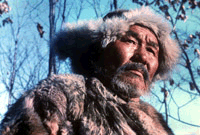Given the expanse of the Siberian wilderness as his cinematic canvas, Akira Kurosawa responds with the visually hypnotic, deeply affecting portrait of nature, friendship, and survival in Dersu Uzala. Based on the journals of Russian explorer Vladimir Arseniev, the film opens to a forest that is being cleared for development, and Arseniev searching for an unmarked grave. Transported back in time, a topographic expedition troop, led by Captain Arseniev (Yuri Solomin), encounters a nomadic, aboriginal (Goldi) tribesman named Dersu Uzala (Maxim Munzuk) who agrees to guide them through the harsh frontier. Initially viewed as an uneducated, eccentric old man, Dersu earns the respect of the soldiers through his great intelligence, accurate instincts, keen powers of observation, and deep compassion. He repairs an abandoned hut and leaves provisions in a birch container so that a future traveler would survive in the wilderness. He deduces the identities and situations of people by analyzing tracks and articles left behind. During a violent winter windstorm, he saves Arseniev’s life by arranging their equipment into a makeshift frame, in order to secure the straw and provide thermal insulation for the fatally cold evening. At the end of the expedition, he leaves the soldiers by the railroad tracks and returns to wilderness, only to encounter Arseniev again, years later, on another surveying expedition. However, time has begun to take its toll on the independent hunter. In an act of self-preservation, he shoots a tiger – an act which he is convinced would exact nature’s retribution – and precipitates his physical decline. Unable to hunt for survival and plagued with guilt over the senseless slaughter of an animal, he accepts Arseniev’s offer to live with his family in the city, and gradually fades… staring at the burning fireplace, lost in his memories, crushed in spirit.
Akira Kurosawa transcends the confines of traditional cinema with the startling imagery and camerawork of Dersu Uzala: the barren trees glowing red from the embers of the campfire; the ethereal blue smoke rising as Dersu points out his family’s burial site to Arseniev; the long, static shot of the two men looking at the horizon, juxtaposed between the rising moon and setting sun; the seamless tracking of the soldiers aboard a raft, drifting down the river; the frenetic panning sequence as Dersu and Arseniev struggle to reap grass during the windstorm. To define Dersu Uzala as a story about an aboriginal tribesman is to describe humanity through a two-dimensional photograph. Dersu Uzala is an allegory for the environmental toll of civilization, a testament to a profound, enduring friendship, and a heartbreaking portrait of aging and obsolescence.
© Acquarello 2000. All rights reserved.
